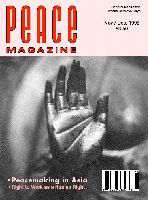
Peace Magazine Nov-Dec 1998, page 29. Some rights reserved.
Search for other articles by PMag staff here
In addition to the new grass-roots campaign of NGOs, the Middle Powers Initiative (see Peace Magazine July/ August 1998) there is an equally important campaign led by governmental officials.
The foreign ministers of Brazil, Egypt, Ireland, Mexico, New Zealand, Slovenia, South Africa, and Sweden have formed what they call a "New Agenda Coalition" with the intention of pursuing the elimination of nuclear weapons and ensuring that they will never be produced again. In its first public statement the coalition recalled that the nuclear weapon states (NWS) had signed legally binding agreements to pursue nuclear disarmament, whereas in fact those states have persistently shown reluctance to fulfill this pledge.
Acknowledging that the complete elimination of nuclear arsenals and development of verification regimes will take time, the group nevertheless urged the NWS to take a number of practical steps immediately, including the following:
abandon present hair-trigger postures by proceeding to de-alert and de- activate their weapons. They should also remove non-strategic nuclear weapons from deployed sites...;
commence negotiations, as agreed by the States Parties to the Non-Proliferation Treaty, on an international ban on the production of fissile material for nuclear weapons or other nuclear explosive devices (Cut-off);
pursue adding new nuclear-weapon-free-zones;
pursue a universal and multilaterally negotiated legally binding instrument for maintaining a world free of nuclear weapons.
Leaders of the New Agenda Coalition and the Middle Powers Initiative have agreed that their goals are identical and that they intend to work collaboratively.
Sources close to the Russian Defence Ministry stated in early October that the United States is considering unilaterally canceling the ABM Treaty that limits the anti-ballistic missile systems if Russia rejects proposed changes to the document. Under the terms of the treaty, each of the two countries must have no more than 100 launch systems and no more than 100 strategic anti-missile systems in one specified area. The United States is going to expand the system in order to cover the entire territory of the country, the sources said. "Russia will never agree to revise the ABM Treaty because this would mean breaking the strategic balance," one of the sources said. Russia has information that the United States may make unilateral decisions on changes to the treaty and then place before Russia a fait accompli, the source said.
The consequences of such a move are unpredictable. Nuclear powers, primarily China, and "threshold countries" may feel encouraged to develop their programs of strategic armaments, the source said, adding that "Russia will have no choice but to develop means against anti-missile systems and supply them to its strategic forces."
Peace activists are celebrating several new victories:
Congress has approved legislation barring the Pentagon from training foreign troops who have committed human rights abuses. The ban, included in the Defense Appropriations bill, prohibits the Defense Department from conducting joint training with units that have a history of human rights violations.
The provision resulted from controversy about ongoing training of Indonesian troops despite a Congressional ban. Troops have been trained that are notorious for mistreating East Timorese, one-third of whose people have been killed since being invaded by Indonesia.

Peace Magazine Nov-Dec 1998, page 29. Some rights reserved.
Search for other articles by PMag staff here